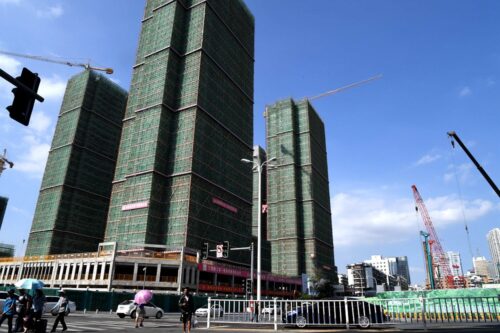>>REAL-TIME UPDATES IN THE WIRE. CLICK HERE<<<
More and more home buyers across China refuse to pay mortgages as the properties they purchased have been left unfinished amid the liquidity crunch in the real estate sector.
As of July 12, home buyers of more than 100 property projects across provinces including Hubei, Henan, Shandong, Jiangxi, Jiangsu, Hunan and Shaanxi had issued statements saying that they refuse to pay mortgage loans as the properties they purchased have been left unfinished, according to a report to The 21st Century Business Herald.
Of the projects, more than 30 are in central China’s Henan province and many are in the provinces of Hunan and Hubei, according to a report by Caixin.
The construction of the projects had been in suspension due to the developers’ liquidity difficulties, which means the home deliveries would be delayed, forcing them to take actions to safeguard their legitimate rights, the homebuyers said.
The developers of the property projects involved include China Evergrande Group, Sinic Holdings, Greenland Holdings, Sunac China, Kangqiao Group, Xinyuan Group, Sichuan Languang Development Co, Zensun Group and Myhome Real Estate Development Group, etc.
For instance, homebuyers of a project developed by property developer Times China in Wuhan, capital city of Central China’s Hubei province, said in a joint statement on July 7 that they had made several attempts to communicate with the developer and safeguard their legitimate rights, but failed to make any progress in the issue and the construction remained in suspension.
“If the construction of the project does not resume by August 1, we will all stop paying mortgages,” the statement reads.
Refusal to pay mortgages in response to delayed deliveries reflects the lack of effective financial supervision of related banks, especially on pre-sales funds, which may have been misappropriated to meet property developers’ debt payments or provide operating funds, they noted.
In their joint statements, the buyers accused banks of granting home mortgage loans before the the main structure of the properties in question get completed, which violated related regulations; transferring funds from mortgages to unregulated accounts; failing to ensure security of pre-sales proceeds, etc.
Most Chinese property developers are heavily dependent on pre-sales proceeds to secure their cash flows and the country has introduced regulations on the use of the proceeds in order to ensure property construction and home deliveries.
As early as 2003, China introduced related rules, under which “home mortgage loans can only to granted to home buyers when the main structure of the properties in question is completed” and “when the funds from mortgage loans is misappropriated for purposes other than property construction, the banks have obligations to bring back the funds.”
Under the rules adopted in 2010, all pre-sales proceeds should be put in custodial accounts and regulatory bodies are responsible for ensuring that the pre-sale funds are used for property construction.
Yan Yuejin, research director of the Shanghai-based E-House China R&D Institute, said that “the flows of the pre-sales proceeds of the projects in question are murky and the regulation on the funds were inadequate, which means, to some extend, banks should be held accountable.”
Notably, in February this year, it’s reported that China was drafting nationwide rules to make it easier for property developers to access funds from sales still held in escrow accounts in a move to ease a severe cash crunch in the sector.
In April, China’s Politburo, the top decision-making body of the ruling Communist Party, expressed supports for local governments’ move to adjust property policies to stablize the housing market and, for the first time ever, pledged to optimize regulations on property developers’ pre-sale proceeds.Read more …
Earlier data has shown that, as of the end of 2021, delayed deliveries in 24 major Chinese cities made up 10% of the total in terms of sales areas, according to real estate consultancy CRIC China.
In the most pessimistic scenario, delayed deliveries would account for 5% -10% of the nation’s total, according to CRIC data, which put the scale of potential mortgage defaults at 360 billion yuan to 730 billion yuan nationwide.
This would be a default rate of 0.9-1.9% of the nation’s total outstanding mortgage loans over the first quarter of 2021.

